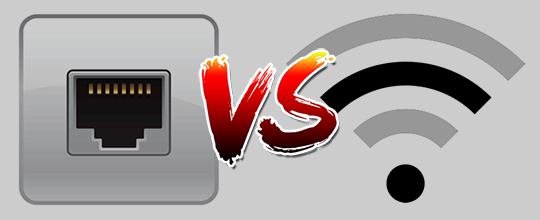
WiFi provides great flexibility, but is the loss of speed and reliability worth it?
Connecting to the internet with WiFi has become incredibly popular, and for good reason. WiFi is easily the most convenient way to get online, as there’s no cable you need to connect, and you’re free to move around with your device wherever you want within your router’s operating range. However, despite WiFi’s advantages, proponents of ethernet will still tell you that in many situations, ethernet is far superior.

WiFi provides so much flexibility – why ever use ethernet?
As great as WiFi is, ethernet offers advantages that are crucial in some situations. The biggest one is speed: the maximum speed of a Cat6 ethernet cable is 10Gb/s, whereas the theoretical top speed of WiFi is only 450Mb/s for 802.11n or 867Mb/s for the newer 802.11ac standard.
While your internet service will likely limit you before you get close to these numbers, wireless connections perform slower than ethernet no matter what your maximum connection speed is. WiFi connections lose information on the way between your computer and the router; information which needs to be resent if it doesn’t make its way to its destination. The further your device is from the router, the more information will be lost along the way, and the slower your connection is going to be.
It’s a good idea to check the difference in speeds you get on your own computer with an ethernet cable and with WiFi. Connection speed checkers are a useful tool for this – when testing your wireless connection, remember to test the speeds you get both close to and far from the router.
Ethernet connections aren’t just faster, but also offer far greater reliability. WiFi connections experience delays as data tries to find its way between the router and device, which will cause short interruptions in your internet connection. While these interruptions are often not even noticeable when browsing the web or listening to music, they can cause major headaches when playing online games.
If your device is stationary, like a desktop computer or a games console, you should always connect it with ethernet because you won’t be making use of the advantages offered by WiFI anyway.
As most PCs today are laptops, and therefore mobile, the question of choosing between wired and wireless internet comes down to whether immobilising your computer with a cable is worth the increase in connection speed and reliability.
Normal web browsing and light internet use
If you mostly use the internet through your web browser, whether for personal or business activities, you will likely not see much difference between an ethernet connection and WiFi. As long as you’re close enough to get a good connection to your WiFi router, the connection should be fast and reliable enough for you to browse the web, listen to music, and even watch some videos without any issue.
Streaming services
Videos use much more data than static web pages and music, especially when watching high-definition content. To stream HD videos on sites like Netflix, your computer needs to receive about 3GB of data per hour. While modern broadband connections can manage that without any issue, your computer can lose connection to the WiFi router for short periods, which might not be noticeable when browsing the web, but could cause a video to buffer.
If you’re finding that videos buffer often when you use streaming services, connecting your computer to your router by ethernet could solve the issue as ethernet offers better connection reliability.
Gaming
Many people say that when playing online games an ethernet connection is an absolute must – and they are mostly right. Online games require the game client on your computer to receive constant updates from the game server to make sure that you don’t fall out of sync.
When the delay between server and client gets too long, your game client doesn’t have the information it needs to display what is happening in the game and will either freeze, or, in the case of many newer games, make a guess as to what is happening. When the new information from the game server arrives, your game client will adjust, which is why game elements sometimes freeze before jumping around the screen when you experience lag.
Even a change in response time from 60 milliseconds to 120ms, a difference too small to notice while browsing the web or streaming music, can make an online game feel sluggish and unplayable.
If you place your computer as close to your router as possible, you may get response times quick enough that you can comfortably play online games. However, it all depends on how much the unreliable response times affect the game you’re playing, and how much patience you have when dealing with occasional lag. PC gamers can speed up gameplay by cleaning their device’s memory with a PC cleanup tool, but your internet connection itself also requires attention.
Most PC gamers and a rising number of console gamers buy and download their games online, and the download files for modern games can be enormous – installing Grand Theft Auto 5 to your computer will download almost 70GB of content! The increased speed of ethernet connections will allow you to download your games much faster than WiFi, so it’s worth considering a wired connection when you’re downloading new games or other big files.
Whether you’re better off connecting to the internet with WiFi or ethernet comes entirely down to what device you have and what you use the internet for. Desktops and game consoles should always be connected with ethernet as they don’t need flexibility, and players of online games will likely want the reliability that a wired internet connection provides – as well as to level the playing field with other gamers who are using it.
In any other scenario than these, it’s hard to justify the loss of flexibility provided by WiFi, especially when the improvements in speed and reliability will be hardly noticeable.




























